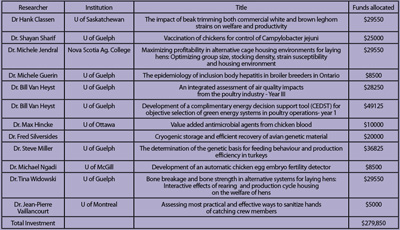
High cholesterol is a risk factor for cardiovascular disease, the
leading cause of death in many developed countries. Eggs are an
excellent source of nutrients, but the egg’s image as a wholesome food
has been tarnished in recent years, ever since a link was established
between high blood cholesterol levels and high incidences of
cardiovascular disease.
A pilot study explores the potential of the probiotic Bifidobacterium and its potential commercial application
| Featured Researcher Dr. Byong H. Lee has been a Principal Research Scientist at AAFC’s Food Research and Development Centre in St- Hyacinthe, Quebec since 1982 and is also an adjunct professor in the departments of food science (until 2009) and microbiology and immunology at McGill University since 1986. After graduating from the universities of British Columbia, McGill, and Laval in Canada, he been an invited visiting professor/scientist at many universities and research institutes in Korea, Ireland, England, and France. His research interests have centered on: dairy microbiology, molecular microbiology and enzyme biotechnology, particularly on molecular cloning and overexpression of lactic and probiotic enzymes to produce bioactive molecules, as well and probiotic and prebiotic research. In addition to 158 publications, he has authored two textbooks on food biotechnology, 15 book chapters, and holds 14 patents/inventions, and has attended 89 international conferences as an invited speaker. He is a member of the editorial board for the Open Microbiology Journal and and is a committee member of International Dairy Federation (IDF) on cheese and enzyme. He has also been awarded several international fellowships. |
High cholesterol is a risk factor for cardiovascular disease, the leading cause of death in many developed countries. Eggs are an excellent source of nutrients, but the egg’s image as a wholesome food has been tarnished in recent years, ever since a link was established between high blood cholesterol levels and high incidences of cardiovascular disease. Despite the fact that new research has shown cholesterol in eggs to have little effect on blood cholesterol levels in adults, and that eating one egg per day does not increase risk of cardiovascular disease, people remain concerned about the cholesterol content of eggs.
Dr. Byong H. Lee of Agriculture and Agri-Food Canada (AAFC) and McGill University, has been looking into methods of reducing cholesterol levels in eggs as a means of producing “specialty or designer eggs.” The cholesterol lowering properties of probiotic bacteria, including Bifidobacteria, have been studied in humans, mice and pigs, with promising results. It is thought that the probiotic strains containing the bile salt hydrolase (BSH) might be responsible for the cholesterol lowering effect of probiotics, as they have a mechanism by which to break down the cholesterol. Lee thought that BSH positive Bifidobacteria might be useful for lowering cholesterol level in hens’ blood serum and subsequently in hens’ eggs. Lee was also interested in learning whether Bifidobacterium strains containing different types of BSH have different cholesterol lowering effects.
Groups of white Leghorn layers (21 week old) were housed in individual cages and assigned into treatment groups, including a control group, for a total of 12 weeks. Treatments included four different types of Bifiobacterium. The body weight and feed conversion ratio (kg of feed/dozen eggs) was calculated every two weeks. Five eggs of each treatment were weighted and boiled and total yolk cholesterol content in eggs and blood serum were determined.
Their findings? The different treatments had no effect on live weight, feed consumption ratio, egg production or daily egg weight. The overall cholesterol concentration in both plasma and egg yolk decreased significantly over time in all treatments, meaning the treatment did not seem to be driving this effect. The reason seems to be that the viability of the probiotic in the feed was reduced, possibly by heat during mixing, storage in refrigerators, and exposure to environmental oxygen and humidity.
The possible cholesterol reducing effect of the potential probiotic also seemed to be masked by other factors such as effect of the feed change at the start of the experiment or even of the hen’s age. The cholesterol reducing effect of the potential probiotic could not be confirmed at this stage, and other critical parameters must be controlled.
Overall, regular poultry feed preparation and handling conditions appear to be too harsh for Bifidobacterium longum. This finding of biological variability of each hen and reduction of cell viability during feed preparation suggest that using Bifidobacterium to lower cholesterol content in eggs is impractical for commercial applications at this time.
 Project funds were allocated from the following: Egg Farmers of Ontario $88,650.00 Lysine Fund $77,375.00 PIC (interest on investments) $60,000.00 Turkey Farmers of Ontario $36,825.00 Ontario Broiler Hatching Egg and Chick Commission $17,000.00 The Chairman and Board would like to congratulate all Note to intending applicants: The Chicken Farmers of |
Print this page